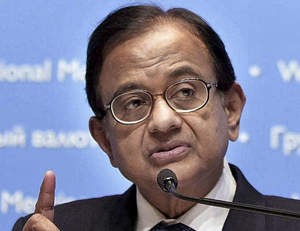 Davos, Jan 22: As India prepares for elections, Finance Minister P Chidambaram today hit out at BJP terming its economic policies as retrograde and "blood-eyed" and asked why the Opposition Party's Prime Ministerial candidate Narendra Modi never fielded a Muslim candidate.
Davos, Jan 22: As India prepares for elections, Finance Minister P Chidambaram today hit out at BJP terming its economic policies as retrograde and "blood-eyed" and asked why the Opposition Party's Prime Ministerial candidate Narendra Modi never fielded a Muslim candidate.
He also expressed confidence that Rahul Gandhi would be Prime Minister if Congress comes back to power, saying the young leader as enough "fire in his belly" for the post, although it was unlikely that any party would get majority and polls were likely to throw a "very very fractured mandate".
Speaking at the World Economic Forum (WEF) Annual Meeting here, Chidambaram also took dig at Aam Aadmi Party, saying there was no place for mob-democracy in India and the country was a party-based democracy where individuals can not be bigger than a party.
On BJP being anti-muslim, Chidambaram said some sections of Muslim people may have voted for BJP, as Narendra Modi himself claims, but the fact is that Modi has never fielded any Muslim candidate ever in any election in his state. "What does that mean," he wondered.
When asked why doesn't he join BJP, Chidambaram said BJP does not represent all sections of India and it does not even have presence in many parts of the country."It has got policies that would destroy the very idea of India. Their's a blood-eyed economic model," he said.
Asked about the next Prime Minister, Chidambaram said, "nothing is impossible, but it is unlikely because Congress party is clear that if Congress is in position to form a government it will be headed by Rahul Gandhi".
In 2004 Sonia Gandhi was elected leader, but the next day she declined and another leader was chosen. That model has worked, but that does not mean that we will have same model again, he said.
"If Congress is called to form the government, I'm pretty certain in my mind that Rahul Gandhi will be the Prime Minister," he said.
Asked whether Rahul Gandhi had enough fire in his belly for the PM post, Chidambaram said: "There was enough fire in his belly when he spoke at the AICC meeting".
On upcoming general elections, Chidambaram said it may be an unfortunate event that no party is a clear winner and no one gets majority, as the elections are likely to throw a very fractured mandate.
Meanwhile, the Finance Minister said that unravelling of AAP has already begun within weeks of it coming to power in Delhi and it remains to be seen whether an "urban rejection" of mainstream parties that was seen in Delhi elections would be replicated in other parts of the country.
"One time that Mrs Gandhi stumbled and brought in an authoritative model that was at the time of Emergency, it failed and she had to go back," Chidambaram said.
In Delhi elections the rejection was for both Congress and BJP, he said, adding that one was ruling the state government and the other municipal bodies.
"But it is just a few weeks and we are seeing an unravelling of the Aam Aadmi Party," he said.
Saying that he was not privy to discussions in the state party unit regarding support to AAP, Chidambaram said Congress party was divided in its decision to give outside support to AAP and it was one section favouring the support that prevailed.
Responding to a query on how BJP can be described as following 'blood-eyed' economic model when factories were not being destroyed in Gujarat and businessmen were happy, Chidambaram said it is not about destroying factories.
Giving examples, he said that BJP is opposing multi brand retail on premise that it would kill jobs, while the fact was just the opposite.





Comments
Add new comment